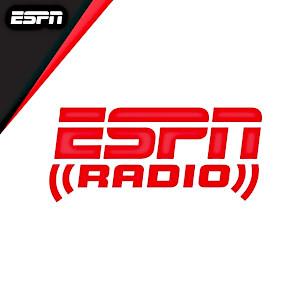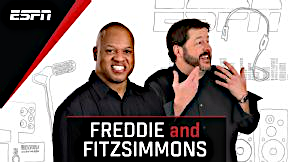
January marks the 30th anniversary of ESPN Radio. The network launched in 1992 with 16 hours of programming, only on weekends.
ESPN Radio now provides more than 9,000 hours of talk and event content annually, on 500 nationwide stations, including more than 375 full-time affiliates and clearance in the top 25 markets.
Freddie Coleman is the co-host of the weeknight ‘Freddie and Fitzsimmons Show’ from 11pm – 2am. Prior to Ian Fitzsimmons joining the program in 2016, Coleman handled the show solo.
Living in New York City in 1987 Coleman became a fan of Sports Talk radio when WFAN adopted the format.
“I never dreamed in a million years I would be working in sports talk radio because I was having so much fun working in music radio,” Coleman recalls for Radio Ink. “When I left NYC and ended upstate in the Hudson Valley, friends of mine were hosting sports talk shows and I got a chance to guest on the shows because I worked in the market. That was the start of the journey from Poughkeepsie to Albany and then on to ESPN Radio more than 17 years later.”
Radio Ink: You have hosted afternoons and nights. Which is better?
Coleman: I don’t think that there is a better place to be doing Sports Talk radio then doing night radio, because everything is happening. Our show is right in the middle of it because games are either finishing up or still going on depending on what coast they are on. It doesn’t matter what sport it is; we have that immediacy that we can react right then and there.
I tell people all the time that we don’t get the love that the morning shows get, and the afternoon drive gets. We clearly understand that because those are the money makers, but that wouldn’t happen without shows like us. We have that chance to put our thought processes out there right then and many times we have the ability to drive tomorrow’s sports headlines.
Radio Ink: What changes have you seen in business?
Coleman: The biggest thing is social media because you have to have that social media presence no matter what medium you are in. Social Media is instantaneous. When you put something out there, people are going to share their feelings about that instantly. Social Media is the biggest game changer. You can ‘say so and so said this on social media’ and all of a sudden that becomes a talking point. That becomes a segment on your show.
 Radio Ink: What’s it like working with a partner?
Radio Ink: What’s it like working with a partner?
Coleman: When working with a partner was proposed to me, I signed off on it right away. The solo thing was working but you know I never minded having a co-host; somebody that I respected, somebody that i know that I’m going to listen to him and he’s going to listen to me.
We don’t need to be amoebas all the time. Sometimes with a co-host you defer to him, but Ian knows I’m not like that and neither is he, so we can have some tough conversations about topics knowing that we are not going to agree on everything. As a matter of fact, in my opinion, the more we agree the worse the show is.
Radio Ink: How important is listening to callers, guests and your co-host in your job?
Coleman: Listening is a huge skill and a necessary one. You just can’t go out there pontificating and not paying attention. You have to pay attention to the elements of the people outside of your sphere. The art of listening is part of the art of conversation. If you’re not listening or paying attention, then the conversation becomes a one-way street. Why would you want a one-way street? Why would you not want to make someone feel included and not excluded.
Radio Ink: Is radio dead?
Coleman: People have declared radio dead and buried so many times, but it always rises up. Radio is going to evolve. Radio is doing that because it has to. Radio has always had the ability to do that, and it will continue to do that. It’s adapted to the other mediums. Radio is always going to be a medium people need to stay in touch. Radio is going to evolve because we evolve.





